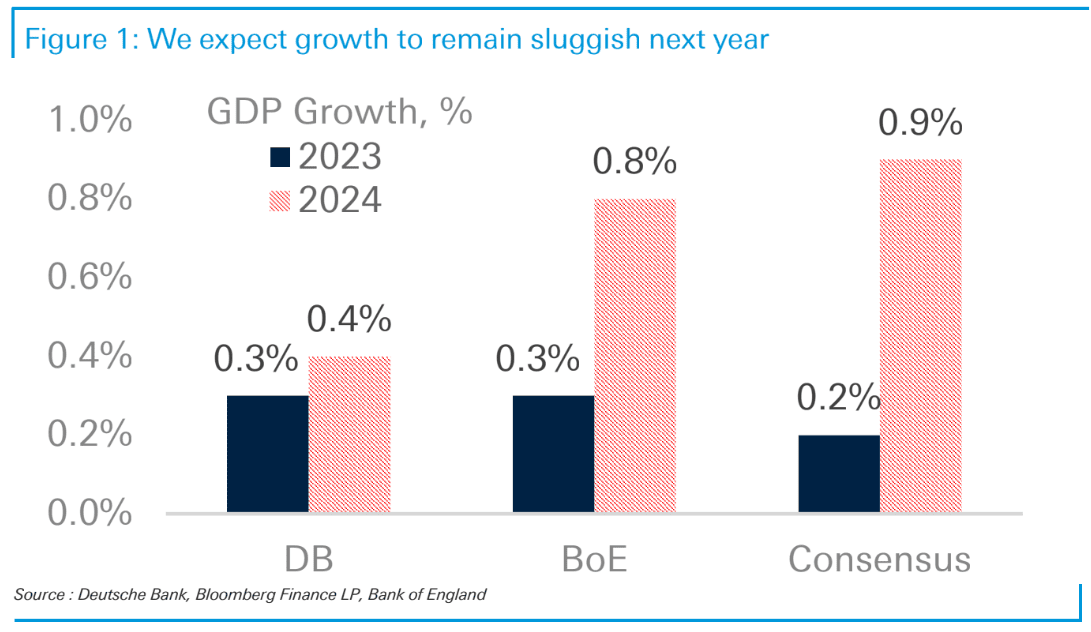Pound Sterling: Buyers of Euro and Dollar Urged to Make a Sober Assessment at These Levels by Equals Money
- Written by: Gary Howes

Above: A broad measure of Sterling strength (top) plotted against Bank of England rate hike expectations. Image courtesy of Equals Money.
Pound Sterling is at strong levels and one payment specialist says there is a risk buyers of euros and dollars risk being disappointed by a negative reaction to incoming data.
It has been a quiet week on the UK data front for the UK currency, but the month kicks off in earnest for the Pound next week with the release of wage and jobs data on Tuesday.
Then on June 21 comes the big one, the release of inflation data, which is followed a day later by the Bank of England's interest rate decision.
Thanim Islam, Head of FX Analysis at Equals Money, says the markets in June have been quiet with lower volatility in the FX space but upcoming events risk unsettling a becalmed market.
He says now would be a good time for clients to take stock of recent gains for GBP to help decide on future buying of foreign currencies.
The calls come amidst ongoing Sterling strength that sees the Pound to Euro exchange rate trade back above 1.16, and the Pound to Dollar exchange rate retake the 1.25 level over recent hours.
The Pound has received support from elevated UK bond yields that rose following stronger-than-expected inflation data from the UK in May. The data caused money markets to increase expectations of the BoE to raise interest rates by year-end from 50 basis points to 100 basis points - "a considerable hike off one number," says Islam.
"However, there could well be headwinds for the BoE to be able to hike rates to this extent," he cautions.
Compare Currency Exchange Rates
Find out how much you could save on your international transfer
Estimated saving compared to high street banks:
£2,500.00
Free • No obligation • Takes 2 minutes
Equals Money says the UK economic outlook could cloud over as the UK's property market remains under pressure as borrowers continue to feel the pain of higher mortgage rates, with those looking to re-mortgage this year likely to see an increase of 4% on interest payments.
"How will homeowners cope with another 1% on top of that?" asks Islam.
Deutsche Bank has meanwhile released new research revealing it has lowered its forecast for UK economic growth while warning economists have gone from overestimating the prospects of a UK recession to underestimating it.
Economists at the investment bank said the effects of higher rates in the mortgage market are expected to gradually impact household disposable incomes and business investment, while trade activity may decline due to a weaker growth outlook in the US and Eurozone.
Above: Deutsche Bank's UK GDP forecasts plotted against those of the consensus, showing risks for significant disappointment.
"Recession risks remain elevated in our view, and we think the consensus is too benign on the risks of a protracted slowdown," says Sanjay Raja, Senior European Economist at Deutsche Bank in London.
According to the Recruitment & Employment Confederation, job hires in the UK were subdued in May due to economic uncertainty as well as pay growth slowing since April as staff supply expanded at the quickest rate since December 2020.
Slowing wage growth could show in next week's jobs figures, in turn prompting a reassessment lower in rate hike expectations.
Islam says all this should send a sense of perspective to those holding the British Pound with a view to transferring into euros, dollars or other currencies.
He says there is a risk Bank of England rate hike expectations come down in response to a weaker-than-anticipated data pulse over the coming weeks.
"We can see clearly the correlation between the expectation of additional rate hikes on the GBP index, which currently sits near 1-year highs," says Islam, citing the top chart.
He adds:
"For buyers of foreign currency, it's worth noting the potential headwinds the BoE could face to keep up with the markets rate hike expectations, and any signs that they can’t/won't could cause GBP to come off these highs."
Compare Currency Exchange Rates
Find out how much you could save on your international transfer
Estimated saving compared to high street banks:
£2,500.00
Free • No obligation • Takes 2 minutes





